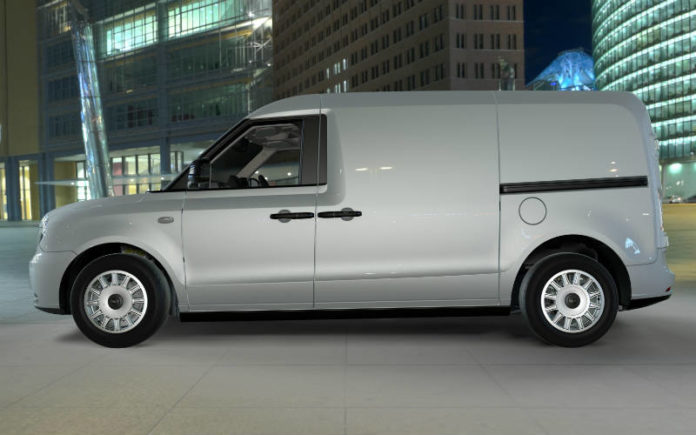LEVC has just announced its latest low emission vehicle: a hybrid medium wheel base van with “range extender” petrol engine.
The new LEVC -that’s the London Electric Vehicle Company to you and me- van will be based on the company’s 2017 TX Electric Taxi, featuring the same lightweight aluminium body, electric powertrain and three cylinder 1.5L petrol “range extender” back up generator made by sister company Volvo.

Early release photos show the van being tested in cold climates.
Its predecessor, the TX eCity black cab, uses a 110kW (150bhp) electric motor, which is powered by a 31kWh battery pack, delivering a maximum torque of up to 255Nm. It is presumed that the new range extender van will utilise the same technology, including the petrol Volvo engine which delivers up to 82bhp, although this is yet to be confirmed by LEVC.
It will offer a zero emissions range of 80-100 miles, after which the petrol engine will kick in and extend the range up to an impressive 400 miles. The van was designed primarily for fleet users who would need a lower emission link for moving goods from out of town distribution sites to city destinations; however could this be a step in the right direction for electric camper van conversions?

The van’s 1.5L petrol engine in action.
The van will be a medium wheel base panel van, with barn doors at the rear and a sliding door on one side. Its exact load capacity is still unclear, but LEVC promises that “there [will be] no compromise on payload,” and that the “payload [will be] comparable with conventional diesel vans.” Although perhaps a touch too small to be a campervan, and aimed primarily at city driving, this vehicle could potentially be on the right track for an eco-friendly compact campervan, with its hybrid-assisted range of 400 miles beating other solely electric van competitors on the market, such as the LDV EV80, whose range only extends as far as 127 miles on a single charge.

Payload space is maximised in this compact medium wheel base van.
The van will have a comfortable cab for long distance drives, and multiple safety features including city braking, traffic sign recognition and lane departure warning. It will also feature geofencing capabilities, which allows electric-only driving modes to be enforced in designated areas such as the London LEZ.
On the exterior the London Taxi windows have been ditched, and a glossy silver paint job will feature instead of the classic “white van man” paint job associated with delivery vans nationwide, although early release photos show a black van with white swirly decals driving around snowy streets, presumably in Sweden. Prototype testing will begin in late 2018, and the van is expected to enter the production line in Coventry in Spring 2019.

Never worry about low emission zones again with the van’s 150bhp electric motor.
LEVC, a subsidiary of Chinese automotive giant Geely, has not yet announced a price for their new van, but they have promised that it will deliver a “competitive total cost of ownership”, but if their TX Taxi is anything to go by, retailing at £55,000, electric vehicles may still be a thing of the future, reserved for fleet delivery companies, until they become more affordable to the masses.





